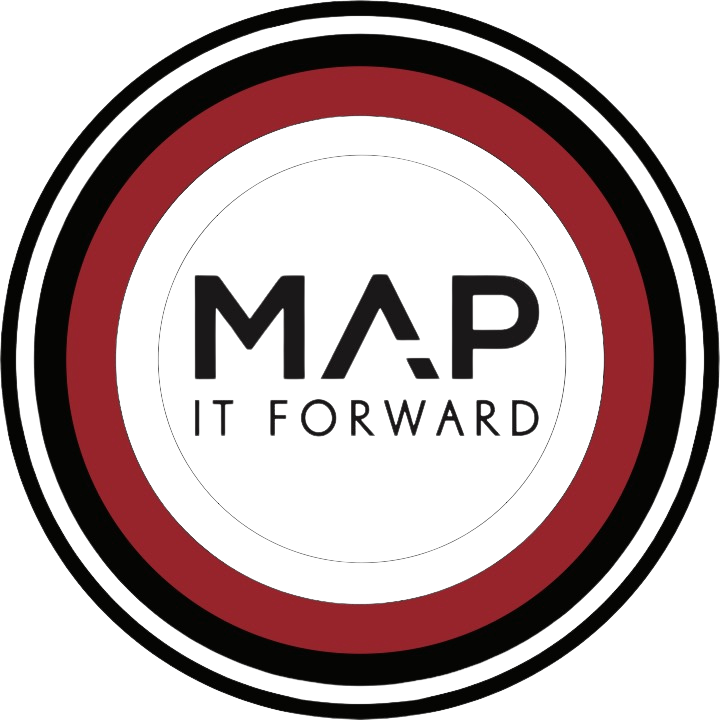Preparing Professionally for the Disruption Caused by a Coronavirus Outbreak
Preparing Professionally for a Coronavirus Outbreak
Unless you've been living under a rock, the term "coronavirus" has by now found its way into your consciousness and perhaps got you wondering how seriously you should be taking this evolving situation in your personal life and professionally.
While we're all hopeful that the threat of a local outbreak never eventuates, according to the CDC (Centres for Disease Control and Prevention) it is "likely that person-to-person spread will continue to occur" at this stage. How likely the chance that it will spread into your specific community is still unknown.
In a recent conversation on the MAP IT FORWARD Podcast with leading Australian Food Safety Scientist Gary Kennedy (Episode #86), he explained that as the incidences of this novel (new) coronavirus, Covid-19, increase, so too does the potential for it to mutate (change) into a possibly more dangerous version of the virus. As you can see, many motivating factors exist for wanting to minimize the incidences of Covid-19 globally and while China reports that there are no significant changes to the genetic makeup of the virus yet, that could change at any time.
The time to become adequately informed and take steps to calmy prepare our industries, communities, families, teams and ourselves for this developing situation is now, before the situation evolves and turns to panic. By definition, once this threat transitions to the pandemic stage (when a disease spreads across a large region e.g. continents) the opportunity to prepare (get ready for something before it happens) has been missed and you'll be reacting in real-time to changing situations rather than calmly putting into action a pre-considered plan.
In this article, we'll discuss; why you should embrace this window of opportunity to prepare professionally in case of a Covid-19 outbreak in your local area, what you should do to prepare professionally, and how your leadership in these situations may be the game-changer your community needs in this challenging time regardless of whether an outbreak eventuates or not.
The Window of Time to Prepare for a Potential Covid-19 Outbreak is Now
In his remarks during a Covid-19 press briefing on Feb 24th, Tedros Adhanom Ghebreyesus, the director-general of the World Health Organization (WHO) said "This is a time for all countries, communities, families, and individuals to focus on preparing."
He goes on to say, "We must focus on containment, while doing everything we can to prepare for a potential pandemic"
Despite his advice, an underwhelming number of people in our coffee industry seem to be taking heed of this warning. This might be because of an increased lack of trust in the media or perhaps the perception that previous pandemics in recent history haven't eventuated in the considerable death tolls that were predicted.
If you're on the fence about whether to take the WHO's warnings seriously or not, I'd ask you to continue reading and consider the question posed at the end of this article before you decide to ignore this situation. Please remember, being prepared isn't about causing hysteria or fueling panic. Being prepared, when done calmly and practically, inspires confidence with your co-workers, employees, customers, suppliers, and colleagues. Something that’s infinitely harder to do when you’re reacting to a situation that you’re underprepared for.
What Should You do to Prepare Professionally?
Preparing for something that may never eventuate is a challenging balance between "Am I doing enough?" and "Have I overdone it?". Approach this the same way you approach insurance; nobody wants to pay for it when they don't use it but everybody's glad they have it when they need to.
There are two aspects of the Covid-19 threat you'll need to consider in your preparations; the spread of the virus itself and the disruption to work and life that may result.
To prevent the spread of the virus itself, I refer you to the recommendations made by the WHO here.
On the matter of preparing professionally for the disruption that may result, here are some steps you can take to get ready.
Step 1: Do an audit of your everyday professional life and question how you'd manage if things were thrown off course.
Here are some examples of questions to contemplate to get you started with your audit:
What are my contingencies if cash flow is disrupted because my customers are unable to pay their bills or they go out of business?
How can I prepare for disruptions to my supply chain?
What logistical steps do I need to take if I am required to close my business for an extended period of time? (Perishable food products, security, trash, etc.)
If I am ordered to shut my business to the public during this outbreak, what will happen to my contracted staff? Are there tasks I can offer them to do from home to keep them earning money? (e.g. Writing up SOP's, spreadsheeting, social media management, etc.) Check if you’re staff want this option, never assume they do or don’t.
Can I visiting customers virtually rather in-person if we're advised to work from home (e.g. Sales calls etc.)
How am I going to manage my rent and other personal bills if my employer has to temporarily or permanently close their business and cannot pay me?
How will I manage my medical and financial situation if I get sick and I don't have medical insurance?
Do I have adequate insurance to cover my business losses if I'm forced to close my business for an extended period?
What are the financial, business, and logistical consequences if a trade show I'm planning on attending, exhibiting at, or teaching at is canceled?
Are my staff taking measures to prepare in case they have to stay at home (food, medication, water, coffee, etc.)?
If someone in my team gets sick with flu-like symptoms, how can we support them through seeking medical help?
How will our team respond to real time situations where hysteria is initiated by our customers?
This is by no means a complete list but rather an example of where to start your audit.
Step 2: Having completed your audit, now it’s time to start devising a strategy to respond to each scenario. Challenge the viability of your strategies with questions; e.g. How much cash and credit do I realistically have access to? How long can I/the business survive before I run out of resources? Where can I cut spending now to maximize my resources? etc etc.
It's important to remember that being in control isn't a reasonable expectation at this stage given that the situation is ever-changing and, to put it plainly, we don't know what, if anything, is going to eventuate. Being prepared for as many scenarios as you can is the best course of action at this stage.
Step 3: Having done an audit, and devised a strategy, now it’s time for leadership.
Pro-Active Leadership Now Will be Remembered Long After Covid-19 is Gone.
Showing leadership in these times will be an important asset to the people around you as anxiety and uncertainty inevitably builds with the increase in media coverage. Whether you're leading yourself, your team, or both, your proactive approach in preparedness may be the example the people around you need to inspire calm and proactive action ahead of a potential crisis if one eventuates.
Assertive communication is key to effective leadership in these situations. Contrary to popular belief, assertiveness is not aggressive communication. Assertiveness is direct, fair, honest communication that respects the rights or the rights as well as your own. (Learn more here)
Sparking calm but honest conversations, whether you're an employee or an employer, about your thoughts, fears, and concerns is an impactful way to build confidence and unity in challenging times.
Taking a passive approach and telling people everything is going to be fine is not assertive communication.
Taking an aggressive approach and telling people we're all going to get sick and die isn't assertive either.
Neither passive nor aggressive communication approaches in your leadership will be effective in getting prepared and helping others to prepare.
Here are some suggestions for assertive leadership for employers and employees/professionals.
Employers, you can lead by:
Communicating clearly and honestly with your staff and customers about how you'll proceed with any changes to your business
Reassuring your staff that you will always be honest with them about your plans and intentions
Taking action on the audit and strategy you put together in steps 1 and 2. Thinking about it won’t be enough
Tapping into reputable sources and sharing factual information regularly with your teams (The CDC and the WHO are my preferred scientific resources. If you're looking for a media source, you might consider "The Daily" Podcast by The New York Times and "NPR News Now" podcast)
Having a ready to go plan for several different scenario's that may eventuate over different scales of time (e.g. about a 100 years ago, The Spanish Flu started claiming lives in January 1918 only to decline in the summer and make a devastating resurgence the next Autumn/fall and continue its devastation till December 1920).
Being transparent with your teams about what your plans and contingencies are
Openly explain to your team, in very practical terms, how you intend to react to different threat levels.
Invite and encourage your team to share their concerns and fears. Intentionally listen to what they’re communicating. It may be helpful to role play any scenarios that may help to manage their anxiety, e.g. of a customer gets hysterical because another customer sneezed near them or an incidence of racism occurs related to this outbreak
Keeping calm and level headed if things escalate quickly, reminding and reassuring your team that you've already worked together to plan for this and you all know what the plan is. (Cut hysteria of as quickly as possible. Hysteria breeds more hysteria)
Clearly explain how you’ll be communicating developments e.g. text, phone, email, Slack, socials, etc.
Keeping your focus on the facts rather than escalating anxiety through hype
Deciding when you'll make the call whether to keep or cancel travel commitments to trade shows etc. e.g. you'll make decisions at the end of each quarter for the next quarter
Manage expectations wherever you can. Reassure people with honest information and give them as much warning as possible if you think things are changing so they can prepare
Respect and don’t shame people for concerns they share. People’s tolerances and coping strategies for these situations are different and while a solution may be obvious to you, it may not be to others
Employees/professionals, you can lead by:
Voicing your concerns assertively and honestly to your leadership about your fears and concerns regarding your impending work situation should an outbreak happen (more info on how to do that here and here)
Telling your employer how they can best support you through this difficult time
Point out blind spots that you think may have been missed in any strategic planning
Finding support if you suffer from any physical or mental health issues to help you navigate potentially challenging times ahead. If you don’t know where to find it, ask your employer or a mentor to help you find the resources you need ahead of an escalating situation
Making sure you have adequate supplies of any medication you need and tell your employer or a mentor if you're concerned you won't be able to afford the extra expense at this time. Explain to them that you’re seeking their advice on how you might navigate problem solving this situation rather than asking for a handout. (There is no shame in being financially challenged, we’ve all been there and may be there again)
Manage your expectations as to how you’ll respond to a changing situation by role playing how you’ll manage changes to your work and personal life at different threat levels. Keep calm and prepare mentally for the changes that may be ahead.
Communicating any changes to the status of your health to your employer and not coming to work if you have a fever or flu-like symptoms. Check here if you're concerned about your symptoms and don't know what to do
Staying informed by reputable sources and not buying into irrational hysteria
The best leaders in times of crisis, no matter whether they're leading themselves or a group of people are proactive rather than reactive.
Proactiveness comes from being prepared when credible warning signs are presented and taking measured action to prepare knowing the threat of danger may or may not eventuate.
If this coronavirus outbreak doesn't escalate after you've gone to all this effort to prepare, at the very least you'll have a great story to speak of in the history of your life. More importantly, though, calmly leading by taking proactive measures to prepare with the people around you in these uncertain times signals that you care enough about their wellbeing to prepare for keeping you all safe when a credible threat is presented. The WHO is telling you in no uncertain terms, this is a credible threat and encouraging you to take it seriously.
So the question I'd like you to consider if you're on the fence about whether to take action to get prepared or not is, "What do you have to lose by calmly taking measures to prepare now?".
Showing leadership through considered, measured preparation builds trust and brings us closer together as a community, as professionals, and as people. Regardless of whether an outbreak occurs or not, what better reason is there to start preparing than that?
This article was written by Lee Safar @leesafar - Founder of MAP IT FORWARD and Elixir Specialty Coffee, and host of The MAP IT FORWARD Podcast. If you’d like to better prepare yourself for becoming a cafe owner and are unable to afford a consultant, we recommend taking our online webinar, presented by Lee Safar and Elliot Reinecke “Navigating a Successful 10 Year Career and Business as a Cafe Owner” which includes a detailed career and business map to help you understand the trajectory of your career and business flow. Click here for more details. For details on hiring Lee Safar as a consultant for your coffee business, connect through social media @leesafar, @imapitforward or here.





